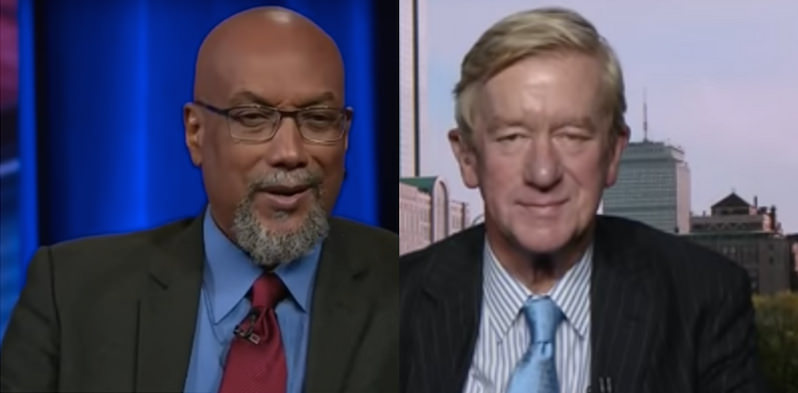Third-Party Vice Presidential Nominees, Left Out of the Debate, Turn to Social Media
The Green Party and the Libertarian Party, largely ignored by the mainstream media and barred from the debate stage, use Twitter, Facebook, Snapchat and other internet platforms.
Viewers around the nation and the two major-party candidates are gearing up for the campaign’s first—and only—vice presidential debate, between Republican Mike Pence and Democrat Tim Kaine on Tuesday evening. But third-party vice presidential nominees, excluded from the stage, are also preparing: They will jump into the spotlight in whatever ways they can. Just as last week in the first presidential debate, it seems as if social media will once again play a key role in helping the under-covered Green and Libertarian parties get their messages across.
Ajamu Baraka, running mate to the Green Party’s Jill Stein, will be appearing via live video Tuesday evening on a variety of platforms. According to a press release, Baraka “will provide his responses to the debate questions alongside Tim Kaine and Mike Pence from a studio in Richmond, Virginia, which will be inserted into the ongoing live feed of the official debate.” His responses will stream on Baraka’s and Jill Stein’s Twitter pages via the app Periscope; on his and Stein’s official Facebook pages; and on Democracy Now!’s special, “Expanding the Debate.”
“Through this broadcast,” the press release adds, “Mr. Baraka will add his unique, independent and revolutionary perspective to a vice-presidential discussion that the Commission on Presidential Debates has sought to limit to the candidates of an increasingly unpopular two-party system.”
Baraka is also planning on taking questions from his social media audience:
Ask me questions before the debate today by using the hashtag #HeyAjamu! Other candidates evade questions, we embrace them.
— Ajamu Baraka (@ajamubaraka) October 4, 2016
The Libertarians, meanwhile, have been campaigning hard for their inclusion in the mainstream debates. Just last week, Libertarian vice presidential nominee Bill Weld appeared on MSNBC to reassert their argument. “We’d love the chance to speak truth to power from the debate stage,” he said, “but if we can’t, we’re going to speak truth to power from the hustings.”
Like the Green Party campaign, the Libertarian campaign has been extremely active on Twitter in the absence of mainstream media coverage. Libertarian presidential nominee Gary Johnson and running mate Weld also rely on the popular phone app Snapchat—just last night, Johnson’s official account on Snapchat was filled with videos and photographs of a campaign event in Denver.
Johnson live tweeted and took to Snapchat during last week’s presidential debate, and it’s likely Weld will employ the same technology during Tuesday’s debate. Weld has also been invited to participate in Democracy Now!’s “Expanding the Debate.”
Both Weld and Baraka could use some positive airtime. Weld shocked supporters when he stated last week, “I’m not sure anyone is more qualified than Hillary Clinton to be president of the United States.” On Monday, he attempted to clarify his remark. “Well, I said I’m not sure there’s anybody more qualified than she is on paper,” he said. “I think Gary Johnson would be the best president because of the policies, fiscal and military and otherwise, that he would implement.”
In addition, Weld has had to defend Johnson over gaffes that the presidential candidate made recently. Johnson followed his now-infamous “Aleppo moment” by revealing that he couldn’t name any foreign leader he admired, and he reinforced the statement later in interviews.
Baraka, meanwhile, has been facing criticism since joining Stein’s campaign this summer. He briefly jumped into the forefront of mainstream election coverage when he referred to President Obama as an “uncle tom president.” The additional, scarce coverage of Baraka similarly has been less than kind.
Recent numbers show that over 40 percent of American voters can’t name Hillary Clinton’s or Donald Trump’s vice presidential nominee, and only “10 percent of Americans say Tuesday’s vice presidential debate may have a major impact on their vote in November.” The most up to date polls show Stein’s campaign polling at an average of 2.4 percent and Johnson’s campaign polling at an average of 7.4 percent.
Even with such low numbers, the third-party politicians are pushing ahead to spread their messages by any means possible, and many social media users are listening:
Lucky for Pence & Kaine, Bill Weld isn’t in it. He’d absolutely destroy those two. #VPDebate
— Ivan Magallon (@ivanmagallonga) October 4, 2016
Only one progressive VP candidate is debating tonight. That’s @ajamubaraka on @democracynow. #VPDebate #debates @timkaine
— Sam Carrico (@samueldcarrico) October 4, 2016
Can we please add “third party candidates” in the next debate.. PLEASE
— Gabbie (@brie0364) October 2, 2016
The press release on Baraka’s planned activities during the Tuesday debate calls the use of social media a “democratized version of the vice-presidential debate.” Both the Green Party and the Libertarian Party are particularly popular among younger, white voters, so it’s not unlikely that many Americans will switch off their televisions Tuesday evening and log on to Twitter, Facebook or Snapchat.
Your support matters…Independent journalism is under threat and overshadowed by heavily funded mainstream media.
You can help level the playing field. Become a member.
Your tax-deductible contribution keeps us digging beneath the headlines to give you thought-provoking, investigative reporting and analysis that unearths what's really happening- without compromise.
Give today to support our courageous, independent journalists.









You need to be a supporter to comment.
There are currently no responses to this article.
Be the first to respond.